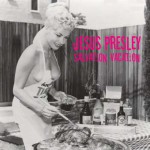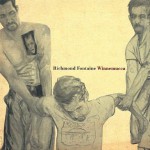 James Angell
James Angell
Private Player
Psycheclectic Records
The road has been a long and winding one for James Angell. Throughout the late ‘80s and into the mid-’90s, James set young women’s’ hearts afire across the region as the lead singer for Nero’s Rome, one of Portland’s most popular bands of that era. Nero’s Rome songs were generally about love and sex, and the pursuit thereof— with Angell’s good looks generating a Morrison-like personae, while the band would converge behind him with INXS-ish precision.
The band consisted of great musicians, many of whom later went on to greater things, including guitarist Tod Morrisey, drummer Tony Lash, and Lash’s replacement (when he left to join Heatmiser) Courtney Taylor. Obviously, Nero’s Rome was no band of hacks. And it’s a true testament to the friendships that were shared that Morrisey and, especially, Lash play key roles in this, James Angell’s first recording since the band broke up nearly seven years ago.
Angell has returned to the frantic fray of the Pop music world with a truly prodigious, work that is quite unlike anything ever recorded before. It has its antecedents, James’ thoughtful songs, near the end of his run with Nero’s Rome, gave evidence that the guy was no dummy. That he had some insight into the human condition, as well as some compassionate wisdom to impart, was obvious, though not fully explored in that incarnation.
Here, James traverses the very borders of Pop song structure (similar, in a way, perhaps, to Radiohead; but entirely different), and, in some instances, reality itself, with a monumentally challenging approach to his craft. It is clear from the start that Private Player is the work of a true artist, exploring the intrinsic idiosyncrasies of his soul.
The album has a distinct, cloistered quality about it, as if the whole project were a painstakingly distilled brandy. Without being told, the average listener will know immediately this is indeed a very private and personal enterprise. It is a fairy tale, of sorts, but a darkly adult fairytale. His young daughters, as well as other family members, even sing in parts of the album, though it seems that the finished product would likely frighten any child under age eight or nine
It all begins innocently enough, with “Ooh Love,” a majestic ballad, propelled by James’ gorgeous open-chords on the piano. His elaborate vocal layers echo tears for Fears or World Party; his gentle, creaking falsetto, mirrored in the mix, careens against soft synth string pads, with Todd Chatalas’ faint acoustic guitar accentuating Tony Lash’s subtle drumwork and Phil Baker’s sublimely elegant fretless basslines. Simply wonderful.
“Who’s Wakin’ Me Up?” picks up the tempo, somewhat. Angell’s piano settings bounce off of Lash’s Mitch Froom-like drum, loops and clockwork-like percussion. Lyrically, a slightly dipsomaniacal edge creeps into the second verse. “If that’s who I think it is/Tell them it’s you know who, sayin’ you know what/And my little friends they talk to me and tell me secrets/ That’s when I say hey that’s cool/ It’s like The Birds, the movie The Birds/ You hear that now, just now/Who’s waking me up?” The song ends with the vaguely disquieting lines: “Then you’re angry/Then you’re bored/Then you make a drinky-poo/And after awhile and after a few/ You say mew little kitty kitty mew mew mew.”
This all serves as an ominous prelude to the harrowing passion play that is “Ed Blue Bottle.” Keening against a strong, angular piano/acoustic bass (Phil Baker again) figure, Daniel Riddle’s subdued electric guitar phrasings and the syncopated drum patterns of Steve Hanford (Poison Idea’s Thee Slayer Hippie) the song slowly begins to melt and drip around the periphery, like a Salvador Dali painting sliding into the horrific chorus. The overall effect is easily the equivalent of Ray Milland’s film “Lost Weekend.”
The chorus of “Call Of The War” seems to bear some melodic resemblance to Duran Duran’s “Ordinary World.” A strikingly organic piece, the interplay of Lash’s loops and synth strings, coupled with Hanford’s subtle drumming and Riddle’s atmospheric guitar interjections (some apparently backwards), recalls some of Kate Bush’s best work for sheer ambience.
“Picture Perfect” begins with a Radiohead-like trip down Variable Speed Lane, before resolving into a Lennonish (think stark, like his first solo album) ballad with gospelly piano and organ backing. Though far more tender in sentiment than Lennon was, James seems to be confronting personal issues as well, perhaps, ultimately with some form of redemption in mind, singing “Pictures don’t lie/ Pictures don’t lie/Pictures don’t say anything.”
Eric Matthews’ muted trumpets mingle with jazzy piano stylings and Morrisey’s sweeping tremolo guitars to created a relaxed, sleepy time children’s lullaby. Brian Wilson’s unrealized magnum opus Smile comes to mind as a referential context to the odd turns that occur throughout this peculiarly simple song.
Brian Wilson again comes to mind in the loopy noise intro of “Dear Dying Friend,” an unsympathetic and rather visionary inquiry into death, or some similar state of sense-deprivation. Out of the mechanical factory conveyor of the verses a monstrous chorus evolves, as if purgatory were about to swallow up the entire horizon, before giving way to some sort of angelic resolution in the middle. A distressingly cathartic number.
Perhaps the weirdest song of all is “Sweet Bell,” a Nilssonesque piece of interstellar space travel that arrives at the acutely bizarre chorus “Sweet as a bell/You’re sweet as a bell/My independent operator/Take control.” Here the voice of young Astrid Angell recites the essential rules of quantum physics, information for which she has no comprehension, as a galaxy of empty space and ever-departing stars swirls around her. “Hold on. Hold on,” James’ friendly voice whispers as he prepares to “dance until the oxygen runs out.”
Mention must be made of Todd Chatalas’ magnificent photographs, especially the photo of shaving cream (?) against a deep blue background that graces the centerfold of the CD insert. The photo perfectly captures the icy isolation and the smooth, padded perceptual existence of substance abuse. The perfect visual accompaniment to Angell’s spacily artful aural stratagems.
James Angell has created an uncompromising masterpiece, a “concept album” that rivals the best by Pink Floyd, the Beatles or anyone else, both for its mature subject matter, as well as its incredibly deep and original vision. This, like any recent Radiohead release, is not an album that one can simply throw on the player for an easy listening experience. It is dense, sobering material that pays huge rewards with its spirit of originality and unique means for expression. The first real album of this new 21st Century.
 Jesus Presley
Jesus Presley
Salvation Vacation
JPX Records
Now in the midst of their seventh year in existence, Jesus Presley— led by the charismatic huckster, Reverend Tony Hughes, have always exhibited a chameleon-like quality, stylistically never quite what they seemed. When many people thought of Jesus Presley as a cocktail nation swing band, they were, in reality a Soul/R&B revue, with dreamy pedal steel guitar flourishes melding with horn charts, Latin percussion and female backup vocals, against a more traditional complement of guitar keyboards and bass: hardly the components of an easy listening contingent.
Having been a member of the band myself, since its inception and for the first five years, I can personally attest to the spirit of experimentation that was always a primary motivator within the band, toward the creation of the material. Now with only Hughes and drummer Jason Mockley remaining as founding members of the band (from the original twelve apostles), the Jesus Presley sound has evolved from its original “Power Lounge” sound toward a more stripped down Punk/Pop sound, reminiscent at times of Bad Religion or Social Distortion.
Now only half its original size, Jesus Presley sports a two (and sometimes three) guitar attack, with nary a keyboard or horn or conga to be found. The new stripped-down sound is held together by Hughes, whose trademark half-spoken baritone, is here supplemented by a second archly urgent, adolescent voice, which matches some of the new agitated rhythms the band employs.
By and large, sex remains the central subject matter for Tony’s songs; good, clean adolescent sex, with kinky undertones. The occasional social-outcast anthem further augments some of the more puerile aspects of the material. A couple of songs, “Show Me Your Sex Face,” veers past the line, into soft pornography.
Still, what is most evident among the ten songs presented here, is that Jesus Presley is entirely Hughes’ conception. Personnel may come or go within the context of the organization. But as long as Hughes is at the helm , the band has a central unchanging identity, regardless of whatever the band’s current stylistic stance.
This is the eighth album in the band’s catalog, which includes a wonderful Christmas collection, a compendium of cover songs and two live records. It is a transitional album, which features two separate sets of guitar duos. The first batch of songs, recorded last year, featured founding member John Anderson and Pete Helfand; whereas the new songs, recorded in February, feature Adam East and Avi in the guitar roles. The new guitarists rock harder, where as the former seemed more attuned to the original Funk/Soul format the band embraced,
Still, with drummer Mockley and veteran bassist John Huckfeldt (formerly of Gravelpit) holding down the rhythm section through both incarnations, the differences in sound are not patently obvious. The lead track, ”Let’s Sin,” rides a “Peter Gunn” sort of riff into overdrive, with Helfand supplying the pyrotechnics.
A revved-up, high octane number, “Cleopatra” is a lesson in history, advising that “ In the Spring of 40 BC,/ She dumped Marc Antony and got with me/We spend our Summers away in Rome/But Alexandria is where we call home.” Adam and Avi add crisply executed guitar accents and fiery fills. A very cool song.
Another tough, hard rocking number is “Modern Miracle,” with huge, chunky power chords driving the guitars. East’s melodic lead figure in the middle section adds welcome texture, as Tony wails “I don’t need to be understood/I’ve been to rehab and it’s all good/I’m so bored with everything/I don’t give a shit about what it means.” Both Adam and Avi provide stellar solos to make of this too a highly memorable cut.
The band’s cover of David Bowie’s “Heroes” is faithfully reverential without being imitative. Hughes adds a certain goofy perspective to his vocal interpretation, while East adds tasty licks throughout the song. “Girlfriend” finds Hughes in a wound-up state; a track that could easily pass for something Frank Zappa might have cooked up for his “Joe’s Garage” series
“I’m In Love” is a strange Funk number with Tony all jacked up about his new girlfriend. “She wears chains and ripped up jeans/Leather boots and a pink mohawk/She’ll kick your ass just for fun/Don’t you know I’m the lucky one.” The boys wrap up the tune with a quick punked out version of the Beatles’ “I Saw Her Standing There.”
A smoldering “Secret Agent From The Future” refers loosely to Johnny Rivers’ “Secret Agent Man.” while carving out a deep, wide groove all its own, over a slow, sensuous guitar riff. “Got it right here in my little black book/Got the wiretap to your phone/Looks like two weeks from this Thursday/ 5:15, you’ll return home/ You’ll turn on the stereo/ Then proceed to undress/You’ll mix yourself a stiff cocktail/And wonder why your life is in a mess.” Great stuff.
“Do Me” is the sort of song that sticks in the mind like bong tar— the tale of the Reverend and a “girl from Mozambique.” The loping rhythm of the first few verses— sprints hard for a verse before lapsing into an orgasmic chorus and middle section. A hit song. The band’s rendition of June Carter Cash’s “Ring Of fire” seems inspired by the Ramones and X.
Tony Hughes and Jesus Presley maintain their high standards of musicianship and songwriting craftsmanship with Salvation Vacation. The band have definitely headed out into new stylistic territory, severing many of their former musical ties, while making strong new ones, at the same time. This is not at all a bad turn of events. It is, indeed, the only thing a band can do to survive, while adhering to one of the most hallowed of all biological imperatives: “adapt, migrate or become extinct.”
 Richmond Fontaine
Richmond Fontaine
Winnemuca
El Cortez Records
Richmond Fontaines’s fourth album (since the band first formed as the Impalas, in 1995) is a continuation in the lineage of material which leader Willy Vlautin seems to cull from the darker regions of the human condition, tracing his Country and Folk roots. With the help of bassist Dave Harding, drummer Joe Davis and (former Jesus Presley member) Paul Brainard on pedal steel guitar and dobro, Vlautin etches his stories in the barroom dust, with the jagged shard of a broken beer bottle.
The small town (population less than 10,000) of Winnemucca lies about one hundred and twenty miles south of the Oregon border in North-Central Nevada, situated near Interstate Highway 80, along the Humboldt River. According to Vlautin, the band “have used Winnemucca as a getaway for the past several years. Most of the songs were written in or somewhere near Winnemucca.”
The album seems to reflect a higher level of sophistication for the band, and a general elevation of the overall world view purveyed within the ten songs presented. Brainard’s mournful pedal steel wails behind “Winners Casino” (a Winnemucan landmark) “Northline” and“Santiam,” while Willy’s voice, though still sounding depressed as a mill town in a clear-cut, no longer seems just at the edge of emotional mayhem, but more at peace with the bleak landscape of humanity that surrounds him. His world weary voice, resembling John Prine’s in some ways.
Brainard’s pedal steel is in the spotlight on the surfy instrumental “Twyla.” “Patties Retreat” is a muscular piece of musique concrete, which seems entirely out of character for the band. But it’s interesting. Balalaika-like mandolins flutter wildly behind Willy’s vocal on “Out Of State.” Block piano chords nail the downbeats of the 6/8 “Glisan St,” a woeful ballad, where Willy’s sorrowful voice seems scarcely able to muster the energy to tell the tale.
A depressing, desolate scenario colors “Degrees Below Zero” in various shades of gray, a disturbing tale of an apparently suicidal victim of child neglect. Not yer average subject-matter for the typical Pop song. Vlautin’s propensity for 6/8 time signatures can be observed again in “Western Skyline,” a moody, forlorn ballad which vaguely resembles James Taylor’s “Sweet Baby James” and the Moody Blues’ “Go Now.” Brainard’s sobbing pedal steel underscores the unrelenting lamentation expressed in most of these songs.
Taking in a Richmond Fontaine album is a lot like consuming a bottle of Jack Daniels: as difficult as the process may seem at times, there is certain to be a redemptive guerdon within the mechanism of the ultimate assimilation of its contents. Willy Vlautin’s unyielding morosity could bring down a wedding party. But there is a place in Country music for Vlautin’s type of observations, and he seems unwilling (or incapable) of looking at life any other way. It all seems like a perfectly miserable marriage made in Honky Tonk heaven.
